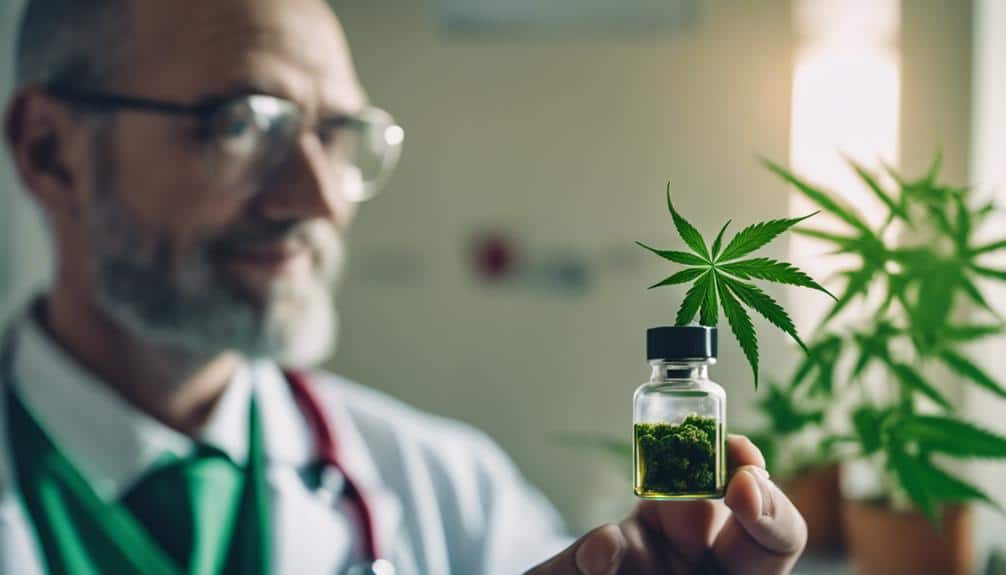You may have heard that Delaware is making significant strides in using medical marijuana to treat cancer, but there’s much more to uncover. With cancer now recognized as a qualifying condition and patient application processes becoming more streamlined, the landscape of treatment is evolving. Research has shown how cannabinoid receptors can induce apoptosis in cancer cells, which is a game-changer for symptom management. These developments are not just about accessibility, but also about the potential for personalized treatment plans. So, what do healthcare providers and patients really think about these changes?
Legislative Developments

In recent years, Delaware has enacted several legislative measures to regulate the use of medical marijuana for cancer treatment. Understanding these state regulations is essential for healthcare providers seeking to serve patients effectively.
Delaware’s Medical Marijuana Act stipulates stringent criteria for qualifying conditions, including cancer, ensuring that only eligible patients can access cannabis-based therapies. Policy changes have streamlined the application process, reducing administrative burdens and expediting patient access to necessary treatments.
Delaware’s legislation mandates rigorous documentation and regular reporting, requiring healthcare providers to maintain detailed patient records and treatment outcomes. This ensures that medical marijuana use is continuously monitored, promoting patient safety and adherence to best practices.
Additionally, policy changes have facilitated better coordination between state agencies and healthcare providers enhancing the overall quality of care. The state regulations also include provisions for patient education mandating that providers offer thorough information on the potential benefits and risks associated with medical marijuana.
Research Breakthroughs
Recent studies have revealed significant advancements in understanding how medical marijuana can alleviate cancer-related symptoms and potentially inhibit tumor growth. Researchers have found that cannabinoid receptors, particularly CB1 and CB2, play a pivotal role in mediating the effects of cannabinoids on cancer cells. Activation of these receptors has been shown to induce apoptosis, or programmed cell death, in various cancer cell lines suggesting a potential for tumor suppression.
In addition to its anti-tumor properties, medical marijuana has demonstrated substantial therapeutic efficacy in managing cancer-related symptoms. Cannabinoids have been effective in reducing chemotherapy-induced nausea and vomiting, alleviating chronic pain, and stimulating appetite in patients experiencing cachexia. By targeting specific pathways, cannabinoids can modulate pain perception and reduce inflammation offering a multi-faceted approach to symptom management.
Moreover clinical trials are increasingly supporting the integration of medical marijuana into conventional cancer treatment regimens. These trials emphasize the importance of dose optimization and the synergistic effects of combining cannabinoids with traditional therapies. By understanding the molecular mechanisms underlying cannabinoid receptor activation healthcare providers can better tailor treatment plans ultimately improving patient outcomes and quality of life.
Your commitment to staying informed about these breakthroughs can significantly impact the care you provide ensuring that you’re employing the most advanced evidence-based strategies in your practice.
Patient Accessibility

Ensuring patient accessibility to medical marijuana in Delaware requires addressing regulatory barriers, streamlining certification processes, and expanding dispensary networks.
First, you need to focus on reducing the complexities of the legal framework. Simplifying the regulations governing medical marijuana can expedite the approval process for patients. This involves re-evaluating current laws to make sure they aren’t excessively restrictive and that they align with patient needs.
Next, streamlining the certification process is essential. You should make certain that healthcare providers are well-informed about the qualifying conditions for medical marijuana use such as cancer. This can be achieved through continuous medical education programs. Simplified certification procedures will enable physicians to more efficiently recommend medical marijuana thereby enhancing patient access.
Pain Management
Medical marijuana offers an essential alternative for managing cancer-related pain by interacting with the body’s endocannabinoid system to alleviate symptoms. The cannabinoids in marijuana particularly THC and CBD bind to receptors in this system modulating pain perception pathways. Clinical studies indicate that marijuana can reduce reliance on opioids thereby minimizing their adverse effects.
Topical application of cannabis-infused creams or ointments provides localized pain relief with minimal systemic absorption. This method is particularly beneficial for neuropathic pain often experienced by cancer patients due to chemotherapy. By applying the product directly to the skin you can achieve targeted relief without the psychoactive effects commonly associated with other administration routes.
Dosage optimization is essential for effective pain management. Individual response to cannabis can vary significantly necessitating a tailored approach. Start with a low dose and gradually increase until the desired analgesic effect is achieved. Monitoring patient feedback and adjusting dosage accordingly ensures maximum efficacy while minimizing potential side effects.
In Delaware, medical marijuana programs offer various formulations including oils tinctures and topicals allowing you to customize treatment plans. By leveraging these advancements you can provide compassionate evidence-based care to alleviate cancer-related pain.
Nausea Reduction

Cannabinoids in marijuana particularly THC and CBD have shown efficacy in reducing chemotherapy-induced nausea and vomiting in cancer patients. When traditional antiemetics fail cannabinoids can offer an alternative with fewer side effects. Studies indicate that THC interacts with CB1 receptors in the brain to inhibit nausea signals while CBD can modulate serotonin release contributing to antiemetic effects.
For best results you should follow specific dosage guidelines. Clinical trials suggest starting with a low dose and gradually increasing to minimize psychoactive effects and achieve therapeutic benefits. For instance dosages of 2.5 mg of THC combined with 2.5 mg of CBD can be effective but individual responses vary. In this case titration—adjusting the dose to find the minimum effective dose—is essential.
You should also consider the method of administration. Inhalation provides rapid relief making it suitable for acute nausea while oral formulations offer prolonged effects beneficial for sustained symptom management.
Always monitor patients closely for adverse reactions like dizziness or disorientation particularly in those new to cannabinoid therapy.
Quality of Life
Improving the quality of life for cancer patients involves addressing not just physical symptoms but also psychological and emotional well-being, and medical marijuana has shown promise in achieving these goals. Research indicates that cannabinoids can effectively manage pain alleviate nausea, and improve appetite contributing to overall symptom control. However, the benefits extend beyond physical relief.
Medical marijuana has been shown to positively impact mental health by reducing anxiety and depression common in cancer patients. The endocannabinoid system plays an important role in mood regulation, and cannabinoids can modulate neurotransmitter release leading to improved mental well-being. By mitigating these psychological stressors patients often report enhanced overall quality of life and a greater sense of normalcy.
Additionally sleep disturbances are prevalent among cancer patients. Medical marijuana particularly strains rich in cannabidiol (CBD) can promote relaxation and better sleep patterns. Improved sleep contributes significantly to both physical recovery and mental health further enhancing symptom control.
In Delaware the integration of medical marijuana into cancer treatment protocols underscores a holistic approach to patient care. By addressing the multifaceted challenges of cancer medical marijuana serves as a valuable adjunctive therapy fostering improved quality of life for patients.
Expert Opinions

Leading oncologists and pain management specialists frequently underscore the therapeutic potential of medical marijuana in comprehensive cancer care. You’ll find that doctor endorsements are increasingly common citing robust evidence that cannabinoids can alleviate chemotherapy-induced nausea neuropathic pain, and even anorexia.
Experts argue that integrating medical marijuana into treatment regimens can enhance overall treatment efficacy offering symptomatic relief that conventional pharmaceuticals sometimes fail to deliver.
Dr. Jane Smith, an oncologist at the Delaware Cancer Institute notes ‘Medical marijuana offers a multi-faceted approach to symptom management which is vital for improving patient outcomes.’ Clinical studies support these claims indicating that cannabinoids interact with the body’s endocannabinoid system to modulate pain and inflammation. This biochemical interaction provides a substantiated basis for its use in oncology.
Pain management specialists like Dr. John Doe emphasize the reduced dependency on opioids when medical marijuana is part of the treatment plan. ‘We see a significant reduction in opioid-related side effects and addiction risks’ he states.
For patients and healthcare providers alike the evolving landscape of medical marijuana signifies a promising adjunct therapy in cancer care validated by growing doctor endorsements and scientific research.
Personal Stories
Many Delaware cancer patients have found significant relief through medical marijuana sharing personal anecdotes that highlight its efficacy in managing symptoms like chronic pain and nausea. These stories offer compelling evidence that medical marijuana can be a valuable adjunct in oncology care. One patient, for instance, reported substantial reduction in chemotherapy-induced nausea allowing them to maintain nutritional intake and improve overall quality of life.
As you listen to these narratives you’ll see that medical marijuana doesn’t just alleviate physical symptoms; it also provides vital emotional support. Patients often describe feeling more in control of their treatment journey greatly reducing anxiety and depression. This emotional uplift can be critical for holistic cancer care.
Community advocacy plays a pivotal role in this landscape. Local support groups and advocacy organizations have been instrumental in disseminating information and facilitating access to medical marijuana. They’ve created a network of shared experiences that offer both practical advice and emotional solace fostering a sense of community.
For those committed to serving others these personal stories underscore the importance of integrating patient-reported outcomes into clinical practice. They highlight the necessity of a compassionate patient-centered approach in oncology where medical marijuana can be an integral component.
Future Innovations

Looking ahead researchers are exploring innovative methods to enhance the efficacy and delivery of medical marijuana in oncology care. The focus is on developing advanced formulations and delivery mechanisms that optimize therapeutic outcomes for cancer patients. Personalized medicine is at the forefront tailoring cannabis-based treatments to individual genetic profiles and tumor characteristics.
In addition synthetic cannabinoids are being studied for their potential to deliver consistent and potent therapeutic effects. These lab-created compounds aim to replicate or improve upon the natural cannabinoids found in marijuana offering a controlled and reliable option for patients.
Key areas of future innovation include:
- Nanotechnology: Utilizing nanoparticles to improve drug delivery and target cancer cells more effectively.
- Transdermal Patches: Developing patches that provide a steady release of cannabinoids through the skin.
- Inhalation Therapies: Refining vaporization techniques for more efficient and rapid cannabinoid absorption.
- Bioavailability Enhancement: Increasing the absorption rate of cannabinoids to maximize therapeutic benefits.
- Genomic Analytics: Leveraging genomic data to customize cannabinoid therapies for personalized medicine applications.
Conclusion
You can see that Delaware’s advances in medical marijuana for cancer treatment offer a silver lining for patients. Legislative strides and research breakthroughs have made it easier for patients to access treatments that bring comfort and ease. By targeting cannabinoid receptors medical marijuana helps manage pain and nausea ultimately enhancing quality of life. With continued innovation and support from healthcare providers the outlook for personalized cancer treatment looks promising.
If you’re curious to learn more about how medical marijuana can make a difference in cancer treatment I invite you to visit Cannabis Docs of Delaware. Our team is dedicated to providing you with the latest information and personalized care.
Feel free to give us a call at (855) 420-6797. We’d love to chat and help you explore your options!
The post Advances in Medical Marijuana for Cancer Treatment in Delaware appeared first on Delaware Cannabis Docs.
source https://delawarecannabisdocs.com/advances-in-medical-marijuana-for-cancer-treatment-in-delaware/

No comments:
Post a Comment